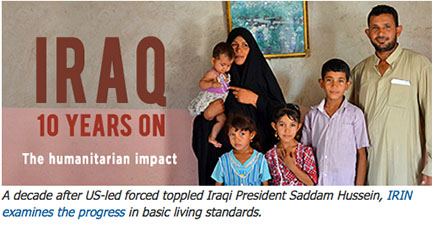
[Webshaykh’s Note: There is an excellent report on the progress in humanitarian aid to Iraq over the past decade on the website of the UN Office for the Coordination of Humanitarian Affairs. Click here to access the full report and updates.]
BAGHDAD/DUBAI, 22 April 2013 (IRIN) – Ten years after US forces took over Iraq, opinions on the progress made are as polarized as ever.
On one side, the Iraqi and American governments argue, the gains have been significant.
“Despite all the problems of the past decade, the overwhelming majority of Iraqis agree that we are better off today than under Saddam’s brutal dictatorship,†Iraqi Prime Minister Nouri Al Maliki wrote in a 9 April opinion piece in the Washington Post, marking 10 years after the fall of former Iraqi president Saddam Hussein.
Paul Wolfowitz, who served as the US Deputy Secretary of Defence between 2001 and 2005, wrote the same day in Asharq al-Awsat newspaper that given the hardships under Hussein, “it is remarkable that Iraq has done as well as it has thus far.â€
Others are more circumspect in evaluating these gains, looking to the 1980s – under Hussein’s rule – as a time when Iraqi society was much further ahead.
“By all measures and standards, there has been a deterioration in the quality of life of Iraqis as compared to 25 years ago,†said Khalid Khalid, who tracks Iraq’s progress towards the Millennium Development Goals (MDGs) at the UN Development Programme (UNDP). “The invasion comes on top of sanctions that came before it and the Iran-Iraq war. It’s one continuous chain of events that led to the situation Iraqis are facing now.â€
Mixed blessings
In the early 1980s, Iraq was regarded by many as the most developed state in the Arab world. The Iran-Iraq war of the 1980s, the Gulf War of 1991 and subsequent years of sanctions took a heavy toll on developmental indicators, yet Iraq continued to have strong state institutions, even if they were used repressively to maintain Hussein’s power. For example, even after 10 years of an international embargo, the system of food ration distribution operated effectively.
The US invasion and subsequent civil conflict changed this, said Maria Fantappie, Iraq analyst at the International Crisis Group, as violence and de-Baathification drove away the human resources needed to run effective institutions. In many ways, the country has yet to recover.
“In 2003, that heritage of an efficient Iraqi state was completely lost,†Fantappie said. “We have the consequences of this until today… We are not yet at the level of state institutions that can deliver services equally to all citizens.”
Iraq is the only country in the Middle East where living standards have not improved compared to 25 years ago, the World Bank says. In areas such as secondary school enrolment and child immunization, Iraq now ranks lower than some of the poorest countries in the world.
“The war is just such a series of mixed blessings,†said Ned Parker, a former fellow at the Council on Foreign Relations and long-time Iraq correspondent for the Los Angeles Times. “For every positive development, there’s a negative development that counters it.â€
Looking at the data
IRIN has taken a look development and humanitarian indicators for Iraq, which show a decade of fits and starts, with progress in one area met by stagnation in another.
Of course, statistics in Iraq are often “wrong, simply not available or politically misused,†as one researcher put it. While a wealth of information and data exists, it comes from a multitude of sources using different methodologies, and much of it is based on relatively small sample sizes. The UN’s Information and Analysis Unit said in a 2008 report: “As is typical in volatile working environments, data reliability in some instances is questionable, contradictory figures exist, and geographic coverage of the indicators is often compromised for either security or political reasons.â€
There are also huge discrepancies when national statistics are broken down by region, with the capital Baghdad and the autonomous Kurdish region in the north often the only governorates ranking above national average in measures of development. As Médecins sans Frontières wrote in a recent article in the Lancet journal, “Much more attention needs to be given to remote areas, where the reality for Iraqis has not substantially improved over the past 10 years.â€
What is more, much of the progress is seen in indicators tracking inputs, like how many children enrol in school, rather than outcomes, such as how much they actually learn, said Sudipto Mukerjee, deputy head of UNDP in Iraq.
But even with these caveats, the best available data offer a complex portrait of a country that has seen improvement over the last decade, but is still largely struggling. For example, a recent overview of Iraq’s headway towards the Millennium Development Goals found great strides in the eradication of poverty over 1990 levels, but slower progress on primary education enrolment, which still lags behind 1990 levels.
A million Iraqis remain refugees, and over a million are internally displaced; sectarianism holds sway over political institutions; and healthcare is undermined by a lack of medical personnel, unreliable utilities and fragile national security. Women and girls, who once enjoyed more rights than other women in the region, now regularly find themselves excluded from school and work opportunities, though great progress has been made towards gender equality in recent years. While living conditions, clean water access, poverty rates and education levels are all disappointing compared to historical highs in the 1980s, they are greatly improved from the years Iraq spent under sanctions. And increased decentralization of power has offered some hope for the future.
No easy narrative can be accurately applied to the country’s experiences over the past 10 years, and in many ways, the direction the country has taken may only become clear over the decade to come.
In the coming days, we will bring you our findings on each of the following indicators. Check back regularly!